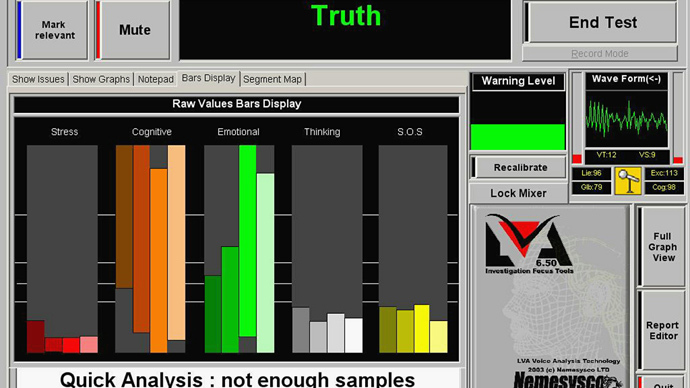A polygraph instructor has been sentenced to eight months in prison for teaching federal job applicants how to deceive a lie detector test. The case has raised concerns over the First Amendment and the legitimacy of polygraph results.
Chad Dixon of Marion, Indiana pleaded guilty last year to wire fraud and obstructing a government proceeding with his business, Polygraph Consultants of America. Prosecutors initially sought a two-year sentence for Dixon, whom they said should be sent a “strong message” for knowingly teaching polygraph counter-measures to federal job applicants and criminal suspects.
Assistant US Attorney Anthony Philips told the court that Dixon trained between 70 and 100 people, including convicted sex offenders and government contractors with security clearance, how to get away with lying. Philips claimed Dixon knew that his customers - who paid Dixon $1,000 a day - were seeking advice on how to deceive federal agents, constituting a federal crime.
“He adopted their illegitimate ends as their own,” Philips said. “Mr. Dixon chose to enrich himself by teaching others how to convincingly lie, cheat and steal.”
But defense attorney Nina Ginsberg asserted that Dixon’s actions were protected by the First Amendment, and that his only crime was explicitly telling his former customers that they should lie about receiving his help.
“It may be unfortunate for federal law enforcement…but it protected speech to tell people how to lie on a polygraph,” Ginsberg said. “Mr. Dixon gave them advice. He didn’t know they were going to follow that advice.”
Dixon wrote in court papers that he had turned to polygraph instruction when his work as an electrician dried up. He told the judge he regretted his action, saying that he was motivated to enter the field by the polygraph’s notorious unreliability, despite its widespread use.
Police interviews conducted on a polygraph are generally inadmissible in a criminal trial and scholars have argued for 50 years that measuring a person’s blood pressure, pulse, and perspiration does not necessarily prove if they are being dishonest. A 1988 Supreme Court ruling declared, “There is simply no consensus that polygraph evidence is reliable.”
One of Dixon’s customers was a Virginia man convicted of a sex crime who had to undergo polygraph tests as part of his probation. He failed seven consecutive tests before signing up with Dixon, but passed three tests immediately after receiving his instruction.
Dixon told the court that his training method simply taught people how to relax when they were being questioned and silently count backward in increments of three on other questions, among other simple techniques.
“I couldn’t believe that this was enough to produce truthful charts,” he said, confessing that the ease of the training provided “a false sense of security as to what I was doing.”
District Judge Liam O’Grady sympathized with Dixon, admitting “the gray areas” between simply sharing knowledge with someone, which is constitutionally protected, and intentionally seeking to deceive the government.
“There’s nothing unlawful about maybe 95 percent of the business he conducted,” the judge said. However, he added that “a sentence of incarceration is absolutely necessary to deter others.”

